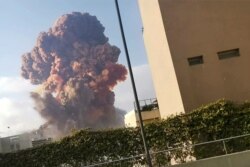Many Lebanese have tales to tell of how they survived the largest explosion in the country’s history, a port blast right in the heart of Beirut that left 6,000 injured, at least 200 dead and 300,000 homeless.
Sometimes it was a door frame that blocked deadly debris; sometimes the lifesaver was a decision to move away from a balcony to prepare a drink just minutes or seconds before the huge explosion of 2,750 tonnes of ammonium nitrate sent shock waves across the Lebanese capital. Some mistook the explosion for an earthquake. Others remember thinking a nuclear bomb might have detonated as their mind’s eye took in an enormous mushroom cloud.
The stories have come thick and fast. But the biggest survival story is yet to be written — the story of how the country restored itself after yet another calamity. The synopsis remains uncertain.
No stranger to disaster, from a devastating 15-year-long civil war to terrorism, Lebanon has had to pick itself up before and rebuild. But the path ahead for a country that was already mired in an existential economic and political crisis even before the blast ripped up the country’s capital is uncertain and strewn with peril.
The dangers for the country are only compounded by Lebanon’s geography — right on the fault-lines of the Middle East’s regional conflicts between Israel and Iran and between Shi’ite and Sunni Muslims.
What next for Lebanon?
The resignation Monday of the government of Hassan Diab has placed the future of the country back clearly and without any disguise in the hands of the so-called zuama, the clique of Lebanon’s sectarian leaders, the arbiters of its power-sharing governance, which was set up to cater to the interests of the nation’s 18 official religious communities. Even before the explosion, the zuama offered no solutions for the economic collapse Lebanon has been enduring, nor any strategies to improve public services. Nor has it come up with ways to plug the trust gap between the country’s long-suffering and increasingly impatient citizens and moribund, corrupt state institutions, say analysts.
“Coming amid a new COVID surge and the Lebanese economy’s meltdown, the fallout from the catastrophic blasts will exacerbate an already dire situation characterized by growing hunger and impoverishment,” say Mona Yacoubian of the United States Institute of Peace in Washington. “Not surprisingly, anger is growing among ordinary Lebanese who view the explosion through the prism of years of government corruption and incompetence. Many point to the blasts as the most dramatic and destructive legacy of decades of cronyism embedded in Lebanon’s sectarian system of government,” she says.
Many analysts believe Lebanon cannot change until the rule of the clan is replaced with the rule of law. The old power-sharing system of governance that’s deteriorated into cronyism, incompetence and graft will have to be replaced — or at least dramatically modified and altered, they say.
That is easier said than done, as the country’s outgoing prime minister acknowledged in a 10-minute speech this week. He denounced a “system of corruption” that is “bigger than the state” and blamed it for bankrupting Lebanon.
There has been talk of calling early elections, but that would likely take around a year or so to organize. The immediate challenge is to set up a government of technocrats, Paul Salem, president of the Middle East Institute, a Washington research organization, told VOA.
That is also not going to be simple. Hassan Diab’s government, which was only formed in January after a protracted political crisis, was a technocrat-based one. When he announced his cabinet, he said it would work on a new election law, fashion an independent judiciary and seek the return of looted public funds.
But his government only had the backing of the radical Shi’ite movement Hezbollah and its Christian allies. Sunni Muslims shunned it.
“It was a disposable government intended to absorb some of the anger from the street,” says Salem. “From the start it was clear it would not be allowed to do anything major and certainly not allowed to succeed, and then it would be disposed of, as is happening now,” he adds. He says the sectarian oligarchs hoped the failure of the government would convince enough people inside and outside the country that at the end of the day, they are the only ones who can deliver anything.
With the government gone, “There's politicking among the oligarchs and there's deep disagreements among some of them,” repeating what happened last year as Lebanese took to the streets calling for change. Salem harbors hopes, though, that this time it will be different.
“Given the collapse and bankruptcy, (the) country desperately needs outside support. So it's a moment when the international community has leverage and knows it. You see President Emmanuel Macron leaning forward. You have U.S. Undersecretary David Gale going to the country. So it's a moment when there is international leverage and there's going to be bargaining with the international community saying, ‘Look, we can help you, but you've got to change,’” he says.
“‘You've got to put forward new leaders. You have to have real reform. It cannot be business as usual.’ The country is bankrupt, the city is devastated, and they have no resources. So the oligarchs are certainly in a tight spot. And it's a moment where leverage can be brought to bear and can be used,” Salem adds.
Salem says it is unclear what kind of government will be formed, and who will lead it. “I imagine it might lead towards a government which has some capable technocratic faces,” he says. For it to work, the new government would need special powers enabling it to sidestep parliament and avoid being entangled in sectarian legislative maneuvering.
Beyond that, the future is murkier.
Will sectarian leaders accept their clout and political power being curtailed and diminished, especially Hezbollah, which amounts to a state within the state? That needs to happen, says Salem, and it one of the major obstacles, if not the biggest hurdle, to reform. He and other analysts say there are few incentives available to persuade Hezbollah to roll back. “But there is some leverage in the fact that Hezbollah does not want the whole country to collapse and the Lebanese don't want another civil war,” says Salem.
Some Lebanese analysts say Hezbollah is already on the back-foot. The resignation of Diab’s government amounts to a major blow for the Shi’ite movement. It was largely responsible for setting up the government in the first place. Many Lebanese suspect that Hezbollah can also be blamed more directly for the blast with allegations mounting that the disaster started with a fire in a Hezbollah arms depot near to the warehouse storing the 2700 tons of ammonium nitrate.
Reconstruction from the blast damage could cost as much as $15 billion, more than a quarter of Lebanon’s GDP last year. In March, Lebanon was unable to repay a $1.2 billion Eurobond, marking the first sovereign default in the country’s history. Even during the civil war in the 1980s it continued to repay state debts. On Sunday a Macron-led video conference of donor countries came up with pledges of emergency aid worth about $298 million. But they have made immediate aid and any future assistance conditional on transparency and reform.
Lebanese analysts say Hezbollah is adopting a wait-and-see strategy about the formation of a new government in order to gauge how much pressure the international community is prepared to put on President Michel Aoun, a Maronite Christian and Hezbollah ally.







